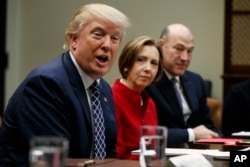U.S. President Donald Trump this week will unveil a budget expected to massively increase military spending while slashing other federal programs.
The proposal, set to be released Thursday, will offer the most detailed look yet at how Trump intends to move ahead with his so-called "America First" policy.
The budget will likely face significant opposition in Congress, where lawmakers are already bickering over a plan to overhaul the nation's health care program.
Many of Trump's fellow Republicans support his plan for a larger military; but, unlike Trump, some want to pay for it by cutting Social Security and Medicare - the two largest federal programs.
Democrats are alarmed about the entire proposal, particularly his plan to cut domestic government programs aimed at protecting the environment and helping the poor.
State Dept., foreign aid cuts
Lawmakers in both parties have also expressed concerns about Trump's steep proposed cuts to the State Department and foreign aid budgets - a move they say will reduce U.S. influence abroad.
White House officials point out the president's proposals are only a blueprint and that ultimately Congress must agree on a final budget, but they insist difficult decisions must be made.
“Unfortunately, we have no alternative but to reinvest in our military and make ourselves a military power once again,” White House National Economic Council Director Gary Cohn told Fox News Sunday.
"It’s no different than every other family in America that has to make the tough decisions when they need to spend money somewhere, they have to cut it from somewhere else," Cohn said.
Defense spending
In a blueprint released last month, White House officials said Trump intends to boost the military budget by $54 billion - one of the largest ever increases in national defense spending. This week's proposal will outline how the president intends to pay for it.
According to budget documents leaked to the media, Trump will offset the military costs with far-reaching reductions in discretionary spending -- the part of the budget that pays for various federal government agencies.
Trump is reportedly considering slashing up to 25 percent of the Environmental Protection Agency budget, 30 percent of the Energy Department budget, and 37 percent of the State Department and foreign aid budget.
Reduction in federal workforce
If passed, those cuts would result in a massive reduction of the federal government workforce, which Trump and his fellow Republicans have long said is bloated and inefficient. It is not clear, however, whether Trump's plans would actually fulfill his campaign promise to reduce the national debt.
That won't be clear until May, when the White House releases its plans to reform the tax code and its proposals for mandatory spending, which covers existing programs like Medicare and Social Security.
Trump has said it is not politically possible to reduce spending on Medicare and Social Security - which together account for nearly 40 percent of the federal budget. He is also considering a $1 trillion infrastructure plan to upgrade the country's roads, airports and rail lines.
According to most analysts, that means Trump will likely continue to run a budget deficit.
The federal debt is expected to grow by nearly $10 trillion over the next decade, according to a recent projection by the nonpartisan Congressional Budget Office.





